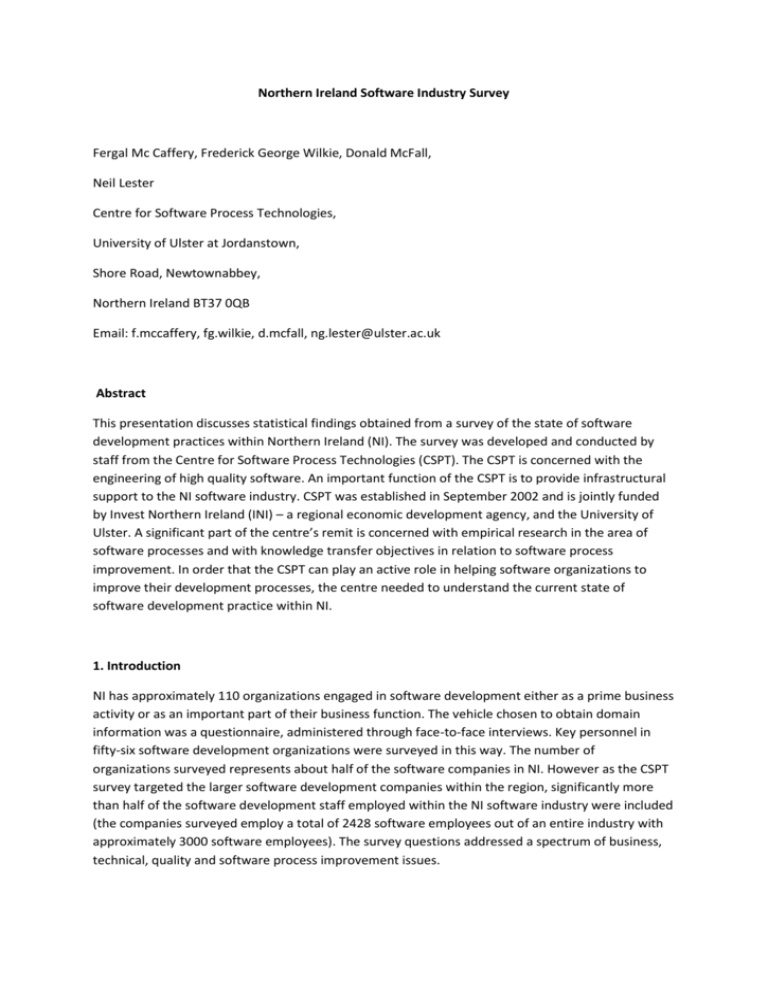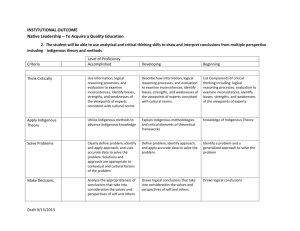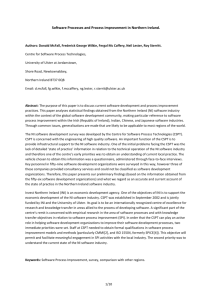software industries
advertisement

Northern Ireland Software Industry Survey Fergal Mc Caffery, Frederick George Wilkie, Donald McFall, Neil Lester Centre for Software Process Technologies, University of Ulster at Jordanstown, Shore Road, Newtownabbey, Northern Ireland BT37 0QB Email: f.mccaffery, fg.wilkie, d.mcfall, ng.lester@ulster.ac.uk Abstract This presentation discusses statistical findings obtained from a survey of the state of software development practices within Northern Ireland (NI). The survey was developed and conducted by staff from the Centre for Software Process Technologies (CSPT). The CSPT is concerned with the engineering of high quality software. An important function of the CSPT is to provide infrastructural support to the NI software industry. CSPT was established in September 2002 and is jointly funded by Invest Northern Ireland (INI) – a regional economic development agency, and the University of Ulster. A significant part of the centre’s remit is concerned with empirical research in the area of software processes and with knowledge transfer objectives in relation to software process improvement. In order that the CSPT can play an active role in helping software organizations to improve their development processes, the centre needed to understand the current state of software development practice within NI. 1. Introduction NI has approximately 110 organizations engaged in software development either as a prime business activity or as an important part of their business function. The vehicle chosen to obtain domain information was a questionnaire, administered through face-to-face interviews. Key personnel in fifty-six software development organizations were surveyed in this way. The number of organizations surveyed represents about half of the software companies in NI. However as the CSPT survey targeted the larger software development companies within the region, significantly more than half of the software development staff employed within the NI software industry were included (the companies surveyed employ a total of 2428 software employees out of an entire industry with approximately 3000 software employees). The survey questions addressed a spectrum of business, technical, quality and software process improvement issues. 2. Findings from the survey The following categories of company participated in the survey. • Indigenous: NI (home grown) software company for which the main part of their business is software development. • Multinational companies whose main business is software development • Any company whose main business is not software development but nonetheless engage in lifecycle activities (these include banks, civil service or smaller businesses developing software in a more limited capacity). 2.1 Business issues It emerged that even though 71% of the software companies in NI are indigenous, they only employ 40% of the entire software engineering workforce. Other companies employ 60% of the NI software engineering workforce. It appears that even though the multi-nationals make up only 12% of the number of overall software companies here, significantly they employ 52% of the NI software engineering workforce. Two thirds of the software companies in NI employee less than 20 people on lifecycle activities, with the indigenous companies generally tending to be in this category. Notwithstanding the positive influence from the presence of some multinational software organisations, many have suggested a limited influence from overseas and an inward looking culture. Issues are present in the percentage of software engineering staff employed from overseas. Indeed when asked about the percentage of staff employed from overseas, many managers have had to trawl their minds to think of any. This is not surprising given that indigenous companies have on average only 2% of their staff from overseas. Many software development organizations rely on one or a small number of clients, and focus on specialized applications. In fact, 30% of software companies are reliant on one client, and this is an obvious concern. It is not all gloom however, as 52% of organisations have more than ten clients. For indigenous companies, the figures sound more encouraging, with only 20% of indigenous companies relying on one client, but there is often an exaggeration of many low value, quick turnaround clients for the indigenous companies. Indigenous companies have problems growing their client base as they compete locally in a limited market place. Also, many of NI’s indigenous companies are one market companies. In fact, 71% of all companies operate within a single sector, and this suggests that companies tend to specialise in one sector, and do not try to expand into other sectors. Many small companies engage in the development of relatively small-scale web-applications, often competing aggressively with each other for a share of a limited local market. Overseas markets have been targeted, particularly in the Republic of Ireland and the U.S.A., but the percentage of revenue generated in those markets is relatively small, often not exceeding 20% [1]. 2.2 Technical issues A broad range of different types of software system are created in NI. By far the most popular type of system is web based transaction systems and although many of NI companies are involved it is the indigenous companies that dominate in the production of these systems. Distributed and transaction types of system are largely produced by government based organisations while not surprisingly, embedded, real-time and safety critical systems are produced by the telecoms and medical device companies. The workforce is distributed fairly evenly across the different types of software category. Web development languages are so prevalent within our local indigenous software companies that 95% of indigenous organizations surveyed use web development languages, with the development of web applications forming the major part of their business. As 71% of the software companies within NI are indigenous companies, and with many of them producing web-based solutions, and given that a number of the larger companies are now also engaging in web development, it is no surprise that web-based development languages dominate. In terms of the more traditional languages, C is the most popular. As there is a need to support transaction based systems, languages such as Cobol survive but only just, and mainly in companies maintaining financial or government related applications. Pascal, Fortran and Ada have now become almost obsolete within the industry. Only 18% of organizations use a formal methodology such as SSADM. 43% of the organizations surveyed that develop software do not use any form of methodology. It is the older more established government and telecoms organisations who make the best use of formal methodologies. Initial survey statistics indicated that 89% of software development organisations surveyed report using tools to assist software development, but the degree of sophistication of these tools varied greatly. A quarter of all companies do not use a configuration management system (CMS). This figure is even less for indigenous software companies with one third of indigenous software companies not adopting a CMS, and 10% of them opting for an in-house solution which often lacks the sophistication of off-the-shelf tools. On a more positive note most software development companies do adopt off-the-shelf configuration management tools (68%) even if they do not make use of the full functionality of the tool. 2.3 Quality issues Due to the slowdown in the world economy training is one of the areas that companies have cutback. In terms of the 56 software companies surveyed the average number of days training per year planned for each software employee was approximately 6 days. It is however noticeable that training is only applied on demand in 21% of companies. Many companies train only on a “can’t survive without it basis”. There appears to be a movement away from planned employee training to demand based. Approximately half of the software development companies surveyed have a team or person who is dedicated to ensuring quality assurance throughout the organization, with 43% of indigenous companies having a dedicated quality team. These statistics initially give the impression that quality is not given enough priority within the local software industry. However upon analysis of these statistics it emerges that 86% of companies with more than ten software employees have a team responsible for quality. There is a generally a low awareness of the need to address quality and significant differences between how different companies define quality. Larger companies and companies with mandatory standards place more emphasis on adhering to quality standards and procedures than smaller companies without any procedures in place. 38% of the companies surveyed adhere to a mandatory standard. Companies adhering to these standards typically tend to produce life critical, real-time or highly secure systems. All of those companies requiring a mandatory standard have of course obtained that standard and in addition three quarters of these companies have achieved ISO9001 [2] accreditation. But the situation is different when it comes to other non-compulsory standards, with 50% of all companies and 47% of indigenous companies being certified to ISO9001. 2.4 Software Process Improvement (SPI) issues Large software development companies stressed the fact that it is essential to have efficient generic processes in place in order to cope with the complexities of managing a large number of employees. It was also emphasized that process is vital whenever companies experience a large growth over a relatively short period of time. Medium to large companies expressed a degree of contentment with the processes they had in place but many had concerns in particular with project management and control. Many NI software companies are small and in such environments it is of course much easier to communicate. When communication is straightforward it takes away the urgency for processes. This explains why for some, process is not an issue of importance and of course for some companies, where software development is not their main business, software processes are never going to be an issue. Many of the medium to large companies have some awareness of SPI frameworks but by no means all of them. Most of the small companies had little awareness of such approaches. 27% of companies had no desire at all to improve software processes through the use of a framework even though many of these companies identified processes as being important. 4% were content with the process improvement brought about by ISO9001 (even though ISO9001 was not actively used for its improvement potential). Encouragingly, 69% of companies had a desire to improve their processes through the use of a framework with 23% of companies firmly in favour of CMM/CMMI [3] or SPICE [4] based process improvement; several of these companies having experienced problems in the marketplace with not being involved in a CMMI programme while their competitors were. Almost half of the companies in our survey desire some form of software process improvement. Only 13% of the companies surveyed were engaged in SPI at the time of being surveyed. However in recent months, after the survey was conducted, many more companies have become involved in some form of SPI initiative and this will have an impact upon the figures. 3. Conclusion General awareness of standards that can be applied to software is limited and while there is some awareness of SPI, there is a distinct lack of familiarity with it. Although many of the medium to large companies are using sound processes governing a strong methodological base, too often many smaller indigenous companies are driven by their entrepreneurial managers and directors who know the processes well and act as mentors to other staff members. For the majority of NI software companies, particularly small indigenous companies, the characteristics of low maturity are evident. Reliance on individuals in a fire fighting environment, low awareness of standards and problems experienced at the managerial and technical level. Many of the larger companies employing most of the software engineers are process focussed and have a much clearer understanding of the need for process improvement. 4. References [1] Momentum Survey 2001. Advancing Northern Ireland through [2] Safety in the Process Industries – Guiding Principles to the implementation of IEC 61508 www.sipi61508.com [3] Capability Maturity Model® Integration (CMMISM) for Software Engineering (CMMI-SW, V1.1, Version 1.1, August 2002) [4] ISO/IEC TR 15504:1998(E), Information Technology – Software Process Assessment, Parts 1-9, Type 2 Technical report. 5. Acknowledgements The Centre for Software Process Technologies is supported by the EU Programme for Peace and Reconciliation in Northern Ireland and the Border Regions of Ireland (Peace II).







